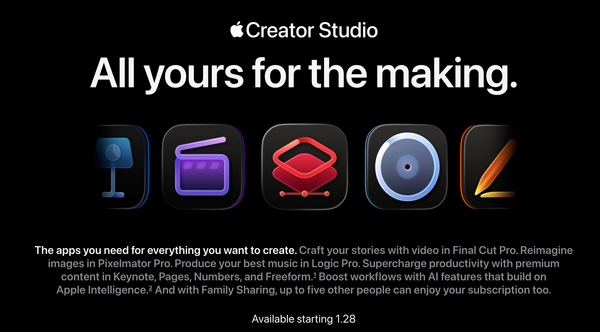Nobody Cares About the Craft — Just the Cash
Passion isn’t dead, it’s just buried under the pressure to monetize. Here’s why creating for joy matters more than the payout.

Passion used to be the spark that lit the fire- now it’s just the packaging. Scroll through any social feed, and it's clear: people aren’t sharing their love for the craft anymore; they’re showcasing their earnings, flexing passive income streams, and turning hobbies into brands.
It’s not about the process anymore; it’s about the proof. Proof that you’re successful, proof that you’re making money, proof that your worth can be measured in metrics and dollar signs.
Somewhere along the way, the joy of creating got lost in the noise of monetization.
In this article, we will be covering the following:
1. Introduction: The Shift from Craft to Cash
Unpacking how passion has been overshadowed by the need to monetize and showcase financial success.
2. The Rise of Performative Success
Exploring how social media turned genuine creativity into income flex culture, where showing off earnings matters more than the work itself.
3. The Death of the “Starving Artist” Archetype
How the romanticism of creating for art’s sake has faded, replaced by the pressure to constantly prove financial worth.
4. The Mental Toll of Chasing Profitable Validation
The emotional burnout of tying self-worth to productivity and the exhausting cycle of seeking external validation through income.
5. Why We Should Reclaim Passion for the Sake of Passion
Reframing the value of creating without profit in mind and finding joy in the process itself.
6. Conclusion: Redefining Success Beyond the Payout
A call to reject performative success, embrace meaningful work, and rediscover the fulfillment that comes from genuine passion.
Introduction: The Shift from Craft to Cash
There was a time when people pursued passions simply for the joy it brought them. Artists created without the looming shadow of algorithms, writers wrote stories not for clicks but for the act of sharing their knowledge or stories, and musicians played from the heart, not for streaming numbers.
But somewhere along the way that changed. Passion isn’t the driving force it used to be. Now, it’s about monetization and virality and more than anything showing success through income.
In the aftermath of the pandemic and amidst an increasingly volatile economy, many have found a new “passion”: teaching others how easy it is to make money by leveraging existing skills and using them to turn a profit.
It’s less about the love of the craft and more about the allure of financial stability in unstable times.
The more we struggle with economic instability the more tempting this narrative becomes and with that so does the obsession with performative success. It’s not just about surviving; it’s about thriving visibly, proving through posts, videos, and income breakdowns that you've supposedly cracked the code to financial freedom.
The process itself has become secondary — what matters now is the ability to showcase the payoff.
The Rise of Performative Success
The internet promised us freedom — a way to share our passions with the world. But it also commodified creativity.
Platforms like YouTube, Instagram, TikTok, and most prominently X (formally Twitter) didn’t just turn hobbies into side hustles; they turned people into brands.
With that shift came a new obsession: not just making money but showing that you are making money.
It’s not enough to love the process anymore. You have to prove your passion pays. Creators post income breakdowns, side hustles, easy money tips, and passive income strategies.
It’s all about the MRR or Profit margins with a low initial investment, not shown with the idea to inspire others to find their path and to leverage what they truly enjoy but rather to flex their financial gains.
The narrative switched from “I love what I do” to “Look how much I make doing it.”
The Death of the “Starving Artist” Archetype
There used to be a certain romanticism around the idea of the starving artist — someone so devoted to their craft that they’d sacrificed financial stability for the sake of the art.
Today, that narrative feels outdated, even irresponsible. Considering how easy it is to make money online, everyone can and should be an entrepreneur. Financial insecurity isn’t noble; it’s a liability.
While it’s great artists can now earn a living through their work, the pressure to constantly monetize and display that success can stifle genuine creativity.
When everything becomes a product, passions get repackaged as content. Musicians released singles designed for TikTok virality rather than cohesive tracks or albums.
Writers optimized their work for SEO instead of storytelling or sharing experiences.
Even hobbies like reading or gaming are filtered through the lens of, “How can I make money from this?” Worst of all it’s not just about making money — it’s about making sure that everyone knows that you’re passion is paying the most.
The Mental Toll of Chasing Profitable Validation
Turning passion into profit isn’t just creatively limiting; it’s emotionally exhausting. When your art becomes your income, failure isn’t just disappointing — it’s financially devastating.
And when your success is measured not by personal fulfillment but by public perception, the pressure becomes unbearable.
The obsession with performative success blurs the line between self-worth and productivity. Creators aren’t just battling burnout from constant output; they’re battling the burnout of having to prove their worth through financial metrics.
It’s not just about doing the work anymore — it’s about watching numbers, comparing growth, and obsessing over algorithms. This constant loop of comparison breeds imposter syndrome, making even the most talented individuals question their value.
Imagine pouring your heart into something you love, only to feel like it isn’t “enough” because it didn’t go viral or generate income. That quiet dissatisfaction festers, turning the thing that once brought joy into a source of anxiety.
The love for the craft fades, replaced by a relentless cycle of pressure, doubt, and fear of irrelevance. The emotional toll isn’t just about burnout — it’s about losing a part of yourself in the process.
Why We Should Reclaim Passion for the Sake of Passion
Passion doesn’t have to die, nor does monetizing that passion have to seize exist. But in order to keep it alive, we need to shift our mindset. Monetization itself isn’t inherently bad — earning from your craft can be incredibly rewarding.
The key is to ensure that the love for the process remains at the heart of what you do, with financial gain being an added benefit, not the sole purpose.
It’s okay to crate for the sake of creating, writing, painting, singing, or building because it fulfills you, regardless of commercial potential.
At Mostly Media, one of our course pillars is helping creators reconnect with that authentic passion, allowing for making money to be an added benefit. We believe in the immeasurable joy and satisfaction that comes from having an outlet of expression, from building something that resonates on a personal level.
The biggest challenge for many of our talents isn’t lack of skill or opportunity — it’s hesitation to start, driven by the fear that they won’t “make it” or the skill won’t “be enough.”
But here’s the truth: success isn’t defined solely by monetary gain. The longevity of passion stretches far beyond the temporary trends or financial rewards.
When you create with genuine intent, the process itself becomes the most valuable reward, and everything else is just a bonus.
Conclusion: Redefining Success Beyond the Payout
In a world obsessed with monetization and performative success, choosing to create without profit in mind is a radical act. It’s a statement that not everything has to be a business, not every hobby has to scale, and not every passion has to pay.
Success isn’t just about money — it’s about meaning, fulfillment, and the quiet satisfaction of doing something you love simply because you love it. And that’s enough.
But if you’re struggling to reconnect with your passion, start small. Create without an audience in mind.
Make something just for yourself — a piece of writing, a sketch, a song — without thinking about how it will be received. Set goals based on the process, not the outcome.
Focus on how it feels to create rather than what it might achieve. And most importantly, allow yourself to be a beginner again, free from the weight of expectations.
Passion thrives in spaces where curiosity is nurtured, not where performance is demanded.
Because at the end of the day, the longevity of passion outlasts any trend, any paycheck, and any fleeting moment of online validation.



